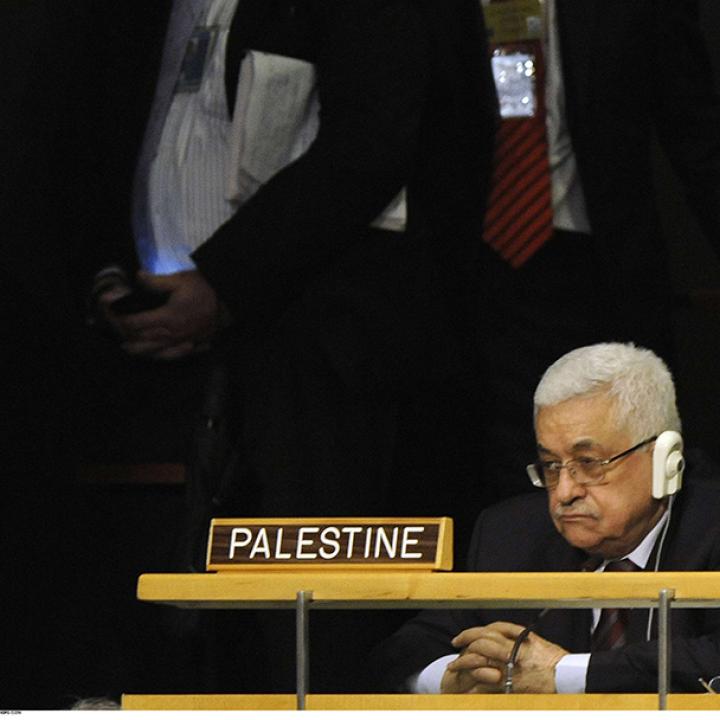

On November 29, the anniversary of the 1947 UN General Assembly vote to partition the British Mandate of Palestine into "an Arab state and Jewish state," the assembly will vote on a new draft resolution recognizing Palestine as a nonmember observer state. A majority vote in favor is all but guaranteed given the near-automatic support from the nonaligned and Islamic blocs and some other delegations.
But in presenting the draft, Mahmoud Abbas and the Palestinian Authority are defying U.S. and Israeli objections to this unilateral move. It fails the test of resolving all issues only by mutual agreement with Israel and could further complicate future negotiations. In addition, enhanced UN status could open the door to attempts at pressing Palestinian demands through such bodies as the International Criminal Court and International Court of Justice rather than through peace talks with Israel.
At the same time, the draft resolution once again puts the PA, along with the entire UN General Assembly, on record as endorsing "the vision of two states, an independent, sovereign, contiguous, and viable State of Palestine, living side by side in peace and security with Israel." This is significant -- especially now, when the rival Hamas movement in Gaza, despite its new ceasefire with Israel, continues to reject the very idea of peace. Both the Israeli and U.S. governments, by contrast, have previously declared their acceptance of the two-state solution.
Some important UN members, such as Britain, have reportedly suggested certain reasonable improvements to the existing draft. One key suggestion is to insert an explicit commitment to resume negotiations with Israel promptly and unconditionally. Another useful improvement would be a Palestinian commitment to refrain from new applications for membership in certain UN subsidiaries -- or at least to refrain from exploiting their new status to practice "lawfare," or legalistic assaults, against Israel in lieu of peace negotiations.
Unfortunately, the latest unofficial accounts indicate that the Palestinians are still refusing these friendly amendments. An alternative might be more general language committing to resolve all issues only through peaceful negotiations. Another possibility would be a side letter or similar understanding to that effect, even if not included in the text of the resolution.
A different but equally helpful set of improvements would be to remove language inconsistent with other, more constructive clauses. For example, one clause toward the end of the preamble affirms "the need for a way to be found through negotiations to resolve the status of Jerusalem as the capital of two states." This implicitly recognizes, for the first time in such a formal document, at least part of the city as Israel's capital. It also accepts the requirement of negotiating this issue rather than simply demanding Jerusalem, or even just East Jerusalem, as the Palestinian capital.
More broadly, draft paragraph 5 recognizes the possibility of territorial adjustments "on the basis of the pre-1967 borders, with delineation of borders to be determined in final status negotiations." And paragraph 6 expresses "the urgent need for the resumption and acceleration of negotiations within the Middle East peace process." These are relatively positive formulations.
Other clauses, however, contradict all of the above by prejudging the issues of borders, Jerusalem, refugees, and settlements, as well as the overall outcome of negotiations. Amending or deleting such language would be a step forward. Otherwise the entire resolution, as it stands, is literally illogical, not to mention potentially harmful.
Conversely, some conceivable last-minute changes to the draft would only make matters worse. In that category falls any mention of Hamas, "resistance," or potential penalties for noncompliance. Such late additions would only push the prospect of productive negotiations, and of meeting legitimate Palestinian and Israeli aspirations for peace and security, even further away.
Regardless of how the exact wording and the vote turn out, much will depend on the follow-up. If the Palestinians fulfill their announced intention to return to peace talks with Israel in good faith, with no artificial preconditions or deadlines attached, that would certainly be welcome. If, however, their next step is to file international lawsuits against Israel, or to maintain their insistence on concessions from Israel even before they sit down at the negotiating table, it would simply confirm the worst judgments about their current UN gambit. The United States should make abundantly clear that its continued engagement -- including any aid or political support -- will depend upon which of those two courses the PA chooses to pursue.
David Pollock is the Kaufman fellow at The Washington Institute.



